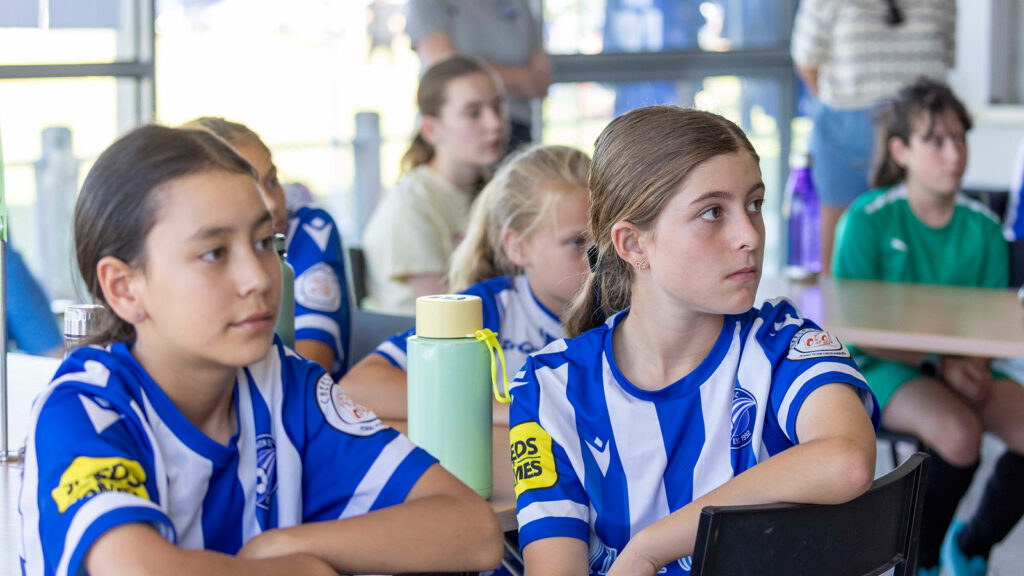For Parents
As a parent or carer, you play a critical role in your child’s mental health and wellbeing.
Sport isn’t just about building skills on the field—it’s also a space where young people develop confidence, friendships, and resilience.
At Read the Play, we’re here to help you understand, support, and guide your child’s mental health journey. Our programs provide practical tools, resources, and education so you can feel confident having conversations about mental health and knowing where to turn for support when needed.

Why Mental Health Matters for Parents:
Your child’s mental wellbeing is just as important as their physical health. As a parent or carer, you are one of their biggest influences, and the way you talk about and support mental health can have a lasting impact.
Home & Sport Are Key Support Systems
Young people often turn to their family and sporting community when they’re struggling.
Early Support Makes a Difference
Recognising the signs and taking action early can help your child develop resilience and coping strategies for life.
1 in 4 Young Australians Experience a Mental Health Challenge
Many struggle in silence because they’re unsure how to ask for help.
Talking About Mental Health Breaks the Stigma
Normalising these conversations makes it easier for your child to seek support when they need it.
How You Can Help
- Encourage Open Conversations
Let your child know it’s okay to talk about how they’re feeling. - Look for Signs of Struggle
Changes in behaviour, mood, sleep, or interest in activities may be a sign they need extra support. - Model Healthy Coping Strategies
Show them how to handle stress in positive ways. - Know Where to Get Help
Connect with Player Wellbeing Officers, and mental health resources if extra support is needed.
Recognising When You Need Help:
As a parent or carer, you know your child best. Changes in behaviour, mood, or daily habits can sometimes indicate they’re struggling with their mental wellbeing. Recognising the signs early can help you offer support when they need it most.
Signs Your Child May Be Struggling:
Emotional Changes
- Persistent sadness, anxiety, or irritability
- Increased anger or frustration over small things
- Expressing feelings of hopelessness or low self-worth
Behavioural Changes
- Withdrawing from friends, family, or activities they usually enjoy
- Avoiding sport, school, or social situationsLoss of
- motivation or struggling to focus
Physical Signs
- Ongoing fatigue or low energy
- Changes in sleep patterns (sleeping too much or too little)
- Appetite changes—eating significantly more or less than usua
Concerning Comments or Actions
- Saying things like “I don’t feel like myself” or “I just don’t care anymore”
- Expressing overwhelming stress or hopelessness
- Risk-taking behaviours, self-isolation, or substance use
Mental health is a team effort. By working together, we can create a supportive space for young players to thrive


What to Do If You Notice These Signs
Check in with them – “I’ve noticed you’ve been quieter lately. How are you feeling?”
Listen without judgment – Let them talk and acknowledge their feelings.
Encourage support – Help them connect with a trusted coach, Player Wellbeing Officer (PWO), or mental health professional.
Seek professional help if needed – If their struggles continue, speaking with a GP, school counsellor, or mental health service can make a difference.
Your support can have a lasting impact. If you’re concerned, don’t wait—reach out and start the conversation.

How Read the Play Supports Parents:
At Read the Play, we know that parents and carers play a vital role in supporting young players’ mental wellbeing. That’s why we provide education, resources, and guidance to help you feel confident in starting conversations about mental health and knowing where to seek help when needed.
Ways We Support You:
- Practical Resources
Access guides, conversation starters, and help-seeking tools designed to support your child’s mental wellbeing. - Club & Community Support
We work with Player Wellbeing Officers (PWOs), coaches, and clubs to create a network of support that extends beyond the home.
- Encouraging Open Conversations
Our programs help normalise discussions about mental health, giving young players the confidence to reach out—whether to you, their coach, or a trusted adult. - Mental Health First Aid Training
Our Mental Health First Aid training equips coaches, volunteers, and community members with the skills to recognise and respond to mental health concerns—offering support when it matters most.
Want to learn more?
Connect with Read the Play for resources and upcoming parent sessions.
Frequently Asked Questions
About Read the Play
What should I do if my child won’t talk to me about their feelings?
It’s normal for young people to struggle with opening up. Keep the conversation open by letting them know you’re there when they’re ready. Try asking indirect questions, like “How was training today?” or “I’ve noticed you seem a bit off—anything on your mind?” If they’re not comfortable talking to you, encourage them to speak to a trusted coach, Player Wellbeing Officer (PWO), or counsellor.
How do I know when to seek professional help?
If your child is experiencing persistent sadness, anxiety, withdrawal, or changes in behaviour for more than a few weeks, it might be time to seek support. A GP, school counsellor, or mental health professional can help assess their needs and provide the right guidance.
Is my child’s school involved in mental health programs?
Many schools offer wellbeing programs and support services. It’s worth checking with their school about counselling services, mental health education, or support staff who can assist.
How can I help my child manage stress and anxiety?
Encourage healthy habits, such as regular exercise, good sleep, and time away from screens. Help them build coping strategies like journaling, mindfulness, or deep breathing. Most importantly, remind them that it’s okay to ask for help.
Looking for more?
Take a look at our resouces and articles for more hints and tips
